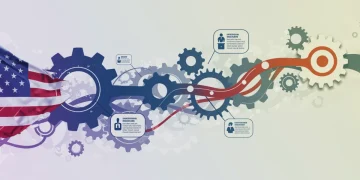Regulation of school data use: what you need to know

Regulation of school data use is essential for protecting student privacy, ensuring adherence to legal standards, and promoting transparency in data handling practices within educational institutions.
When it comes to regulation of school data use, understanding the implications is key. Have you ever wondered how your child’s data is being managed and protected? This article sheds light on the essentials.
Understanding school data regulations
Understanding school data regulations is crucial for ensuring that students’ information is handled properly. Regulations exist to protect the privacy of students and ensure transparency in how data is used in educational systems.
Why Regulations Matter
Regulations are not just rules; they are safeguards. They help maintain trust between schools and families. With proper regulations, schools can secure sensitive information and prevent data breaches.
Key Regulations to Know
- FERPA (Family Educational Rights and Privacy Act) protects the privacy of student education records.
- GDPR (General Data Protection Regulation) is important for schools in the EU, ensuring data protection and privacy.
- COPPA (Children’s Online Privacy Protection Act) focuses on the online collection of personal information from children under 13.
In addition to these regulations, there are state laws that may have specific requirements regarding the use of school data. Schools must stay informed about these laws to comply properly.
Impact on Schools
Complying with these regulations often requires schools to invest in training for staff. They must understand how to handle student data responsibly. This includes knowing whom to share data with and what information is confidential.
Furthermore, engaging parents in discussions about data use creates transparency. By informing parents about data practices, schools build stronger relationships and trust within the community.
Best Practices for Compliance
- Regularly review data management policies to ensure compliance.
- Provide training sessions for staff about data privacy.
- Maintain clear communication with parents regarding data usage.
Every educational institution must prioritize understanding school data regulations. This not only protects students but also promotes a safe learning environment.
Key principles of data protection in schools
Key principles of data protection in schools are essential for safeguarding students’ personal information. Understanding these principles helps schools create a secure environment for students and their families.
Transparency
Being transparent about data collection is crucial. Schools should inform parents and students about what data is collected and how it will be used. This openness fosters trust and encourages responsible data handling.
Data Minimization
Another important principle is data minimization. Schools should only collect the data necessary for their functions. By limiting data collection, schools reduce the risk of data breaches and ensure that student information is not misused.
Access Control
- Defined user access: Only authorized personnel should have access to sensitive data.
- Regular reviews: Schools must conduct regular reviews of who accesses the data to ensure compliance.
- Secure storage: Data should be stored securely to prevent unauthorized access.
Having strict access control measures in place protects student information from breaches. Schools need to be proactive in controlling who can view and use data.
Data Security
Implementing robust data security measures is essential. Schools should invest in technology that protects data from cyber threats. This includes using encryption, firewalls, and antivirus software to safeguard information. Moreover, staff training on cybersecurity threats can strengthen the overall protection of data.
Accountability
Finally, accountability is vital in data protection. Schools should have clear policies and procedures for managing data. This ensures that everyone understands their roles in protecting student information. Regular audits can help verify compliance with data protection laws and improve practices.
By embracing these key principles, schools can create a secure environment that prioritizes the safety of student data. It helps build a supportive community where parents and students feel confident about how their information is handled.
Impact of regulations on student privacy

The impact of regulations on student privacy is significant in today’s digital age. Increased reliance on technology in education has brought attention to how student data is collected, stored, and used.
Increased Protection
One major impact is the enhanced protection of student information. Regulations like FERPA require schools to be transparent about their data practices. This means schools must inform parents and students about what kind of data is collected and how it will be used. Understanding these rules empowers families to take control of their personal information.
Enhancing Trust
When schools adhere to regulations, they foster trust within their communities. Parents are more likely to feel comfortable sharing their child’s data if they know it is protected under strict laws. This trust can lead to stronger engagement from families in school activities and initiatives.
Implementation Challenges
- Resource allocation: Schools may struggle to allocate sufficient resources for compliance.
- Staff training: Teachers and administrators need training on how to handle data properly.
- Technology upgrades: Schools might require technology upgrades to meet data protection standards.
Despite the positive effects, many schools face challenges in implementing these regulations. Balancing compliance with their educational mission can be difficult, but it is essential for protecting student privacy.
Legal Accountability
In addition, regulations hold schools accountable for their data handling practices. Failure to comply can lead to legal consequences and financial penalties. This accountability encourages schools to take data privacy seriously and to invest in secure systems that safeguard student information.
Future Implications
As technology continues to evolve, the impact of regulations on student privacy will likely grow. Schools must stay informed about changes in the law and adapt their practices accordingly. This ongoing vigilance will help ensure that student data remains safe in a continually changing digital landscape.
Best practices for schools in data management
Adopting the best practices for schools in data management is essential for maintaining student privacy and ensuring compliance with regulations. Implementing effective strategies can enhance data security and build trust with families.
Regular Data Audits
One of the key practices is conducting regular data audits. Schools should routinely check their data collection, storage, and usage processes. This helps to identify any risks or vulnerabilities in their data management systems.
Staff Training and Awareness
It is also important to provide continuous training for staff. Teachers and administrators need to understand data privacy and security measures. When staff are informed, they can better protect student information. This includes being aware of how to handle sensitive data and recognizing potential threats.
Data Encryption
- Encrypt all sensitive data: Protecting information through encryption ensures that even if data is accessed illegally, it remains unreadable.
- Use secure connections: Always utilize secure connections (like HTTPS) when transmitting data.
- Install firewalls: Firewalls act as a barrier between trusted internal networks and untrusted external networks.
By implementing data encryption, schools can significantly reduce the risk of unauthorized access to student information. It’s a critical step in creating a secure environment.
Clear Data Management Policies
Establishing clear data management policies is also vital. Schools should have documented procedures about how data is collected, who has access to it, and how long it is stored. Making these policies accessible to staff and families enhances transparency and accountability.
Engaging with Parents
Engaging with parents regarding data usage is a best practice that fosters trust. Schools should communicate openly about how their child’s data is collected and used. Informational sessions and newsletters can educate families about data protection efforts, making them feel more secure.
Using these best practices, schools can create a robust framework for managing data. Doing so allows them to protect student privacy while building strong relationships with the community.
Future trends in school data regulation
The future trends in school data regulation are increasingly shaped by advancements in technology and growing concerns over data privacy. As schools adopt more digital tools, regulations will adapt to address these changes.
Increased Focus on Data Privacy
One emerging trend is the heightened focus on data privacy. Schools and legislators are recognizing the need to protect student information more vigorously. As a result, we can expect stricter regulations that require schools to implement robust security protocols.
Integration of Artificial Intelligence
The integration of artificial intelligence in education is another trend influencing data regulation. AI tools are being used to enhance learning experiences, but they also raise questions about data usage. Future regulations will likely address how AI interacts with student data, ensuring that privacy is maintained.
Parental Control and Access
- Enhanced parental access: Parents may demand greater access to their child’s data and learning analytics.
- Transparency requirements: Schools might be required to provide clear information on data collection practices to parents.
- Tools for data management: New technologies could be developed to help parents manage their child’s data more effectively.
With these changes, schools will have to establish clear communication channels with parents regarding their child’s data. Educating families about data practices will become essential.
Regulatory Adaptation
Additionally, regulations will need to adapt continuously. As new technologies emerge, schools must stay current on regulatory changes. This might include new laws or guidelines that focus on data protection in an evolving digital landscape. Schools will benefit from regular training and updates to comply with evolving standards.
Collaboration Across Sectors
Finally, collaboration between schools, technology providers, and lawmakers will be crucial in shaping effective regulations. By working together, stakeholders can create comprehensive policies that protect student data while allowing for innovation in education. As educational technology advances, shared responsibility will be vital for ensuring effective data management.
In conclusion, understanding the regulation of school data use is essential for protecting student privacy and ensuring compliance with evolving laws. As technology advances, schools must adopt best practices that prioritize data security while fostering trust with families. Embracing new trends in data regulation, such as increased transparency and AI integration, will help create a safer educational environment. By working together, educators, policymakers, and families can navigate the challenges of data management and promote a culture of security and responsibility in schools.
FAQ – Common Questions About School Data Regulation
What is the importance of data regulation in schools?
Data regulation is crucial for protecting student privacy and ensuring that schools comply with legal requirements related to data handling.
How can schools enhance data security?
Schools can enhance data security by conducting regular audits, providing staff training, and implementing strict access controls.
What are some future trends in data regulation for schools?
Future trends include increased transparency, the integration of artificial intelligence, and ongoing adaptations of regulations to keep up with technology.
Why is community engagement important in data management?
Community engagement is important because it helps build trust between schools and families, facilitating better communication about data practices and privacy.






